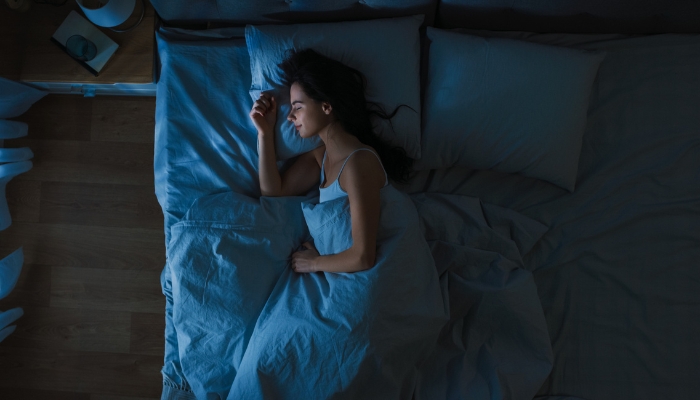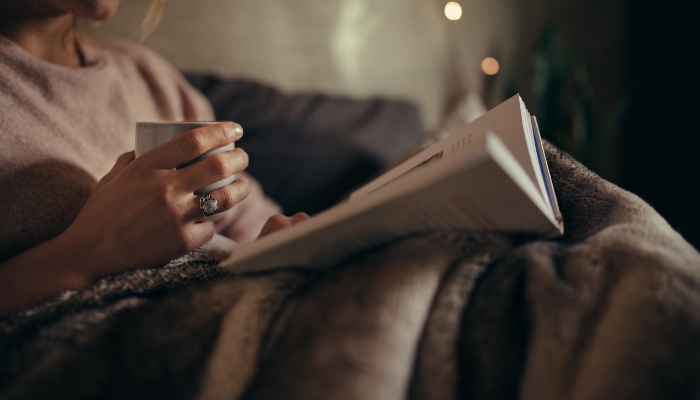There's no denying the toll that stress can take, especially on your sleep. And since this month is National Stress Awareness Month, it's time we talked about the science behind stress and its effect on sleep, and most importantly, how to reduce your stress!
According to the American Psychological Association, the five major stress factors include money, work, family, economic outlook, and relationships. But even with these stressors, there are ways to reduce their impact on your sleep. In fact, getting more sleep is one of the best ways to counter excessive stress — these tips are just the thing to help you snooze away!
How Stress Affects Your Sleep

First things first — what is stress? Stress is your body's physiological and mental response to serious or dangerous situations, which causes your autonomic nervous system (ANS) to release adrenaline and cortisol. This reaction raises your blood pressure, muscle tension, breathing, and blood sugar and is known as your "fight-or-flight" response.
When it comes to sleep, chronic stress will disrupt your regular sleep-wake cycle and reduce the amount of REM sleep you receive (the deep, slow-wave sleep). The increased muscle tension, elevated heart rate, and digestive issues are a recipe for insufficient sleep!
Did You Know? Up to 43 percent of people aged 13 to 64 have reported lying awake at night due to stress — it's not just you!
1. Relaxation Techniques

The science of sleep and stress gets a little complicated. Still, thankfully, you can avoid having excessive issues by limiting your anxiety with relaxation techniques like mindfulness meditation and deep breathing!
- Mindfulness meditation reduces stress by making you more aware of the present moment while acknowledging thoughts, feelings, and sensations, even if these thoughts are negative.
- Body scanning is a technique where you slowly concentrate on each part of your body and notice all the sensations as you scan from head to toe (or go random, your choice), so you can focus on your body and physically let go of stress.
- Guided meditation involves following an app or video, leading you through a meditation technique to help you relax.
- Deep breathing means taking slow, even, and deep breaths by holding your breath and exhaling slowly in timed reps to help ease tension.
Practice any of these relaxation techniques 10 to 30 minutes before bed to help alleviate stress and fall asleep easier.
2. Exercise

Exercise is also a tremendous stress-relieving and sleep-inducing technique because it pumps up the endorphins and other natural feel-good chemicals in your brain. So, try engaging in moderate to intense physical exercise for up to 30 minutes every other day to help reduce stress levels and improve sleep. But if you don't have time for a complete regimen, try light yoga stretches!
But make sure you don't do heavy exercises right before you go to sleep since the increased heart rate and body warmth might prevent you from falling asleep as soon.
3. Reduce Caffeine & Alcohol
You might think that a glass of wine before bed will help you sleep better, but you'd be surprised by what harmful effects it can do on your sleep. The alcohol might help you fall asleep faster, but it can limit the amount of time you spend in REM sleep initially, then cause a rebound effect of increased REM sleep all at once, which leads to more awakenings and lighter sleep. So it's best to avoid it or limit your intake before bedtime if you can.
Caffeine also negatively affects your sleep because it elevates your cortisol and adrenaline levels, just like stress does, and interferes with deep, restful sleep. So, if you can't live without your java fix, stop taking it well before bedtime!
4. Dim the Lights

Lights can be a big sleep disruptor, especially if you're already dealing with high-stress levels. When surrounded by dim light, your body naturally starts producing melatonin, but artificial blue light from your TV, tablet, smartphone, or computer messes with your body's natural production. This interrupts your body's regular sleep-wake cycle!
So, it's best to limit screen time before bed, especially if you spend time doom-scrolling news outlets before bed (oops!). Instead, try implementing other relaxing activities before bed, like reading a physical book, doing adult coloring books, or even a crossword.
5. Worry Time
Sometimes, there's no avoiding stress and anxiety, and that's okay. So, when that happens, schedule yourself some time in your day to go over your worries in a technique called cognitive-behavioral therapy (CBT). This way, you address your stressors head-on and address each concern before they spiral out of control
Pro Tip: You can also use the time to journal your worries, write down what makes you anxious or stressed, and make a positive to-do list!
6. Calm Sleep Environment

Another way to promote good sleep even when stressed is to create a calm bedroom environment. This means keeping the bedroom cool, dark, and quiet. But most importantly, it means only using your bed for sleep — no more laying there with anxious thoughts!
Going to bed when you feel sleepy helps train your brain to associate your bed with deep sleep instead of stressing.
Pro Tip: Don't forget to limit the electronics in your room, like not having a TV in the room, and reduce the amount of artificial light!
7. Warm Bath
Do you remember getting so sleepy after bath time as a kid? It turns out that applies to us adults, too! A warm bath or hot shower is an excellent way to relax since the warm water relieves muscle tension and helps you sleep.
It also increases your body temperature, so when you get out of the shower or bath, you experience a drop in temperature just like you experience every night when you go to sleep! The decreased body temperature makes you sleepy, so your bedroom temperature must be cooler than your bath!
Bonus: Wind Down Routine

Along with a calm sleep environment, you'll also need to stick to a wind-down routine! Sleep and habits go hand in hand, so the more routine you are, the easier it'll be to fall asleep because your brain will know when it's time to sleep. So, pick a few relaxing activities from this list and incorporate them into your daily routine.
And don't forget to follow good sleep hygiene, which means sticking to the same sleep and wake times every day (even on the weekends!).
Bye Bye Stress, Hello Sleep!
Limiting your stress levels can be tricky and overwhelming, but we hope these tips will set you on the road to sleep success. But if you still find yourself counting sheep, you might need a mattress upgrade at Western Living! With a proper mattress even supporting your body, getting deep sleep is much easier!
Have any questions? Give us a call or stop by — your sweet dreams await you!

